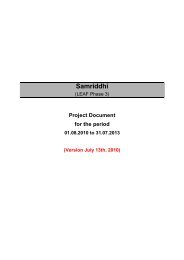Coorperation Strategy - Albania 2010-2013 - Deza - CH
Coorperation Strategy - Albania 2010-2013 - Deza - CH
Coorperation Strategy - Albania 2010-2013 - Deza - CH
You also want an ePaper? Increase the reach of your titles
YUMPU automatically turns print PDFs into web optimized ePapers that Google loves.
ALBANIA <strong>2010</strong>–<strong>2013</strong><br />
of the implementation of these goals is based on<br />
a comprehensive list of 45 indicators (published<br />
annually in the national progress reports).<br />
Switzerland specifically supports <strong>Albania</strong> in its efforts<br />
to reach the goals set out in the two pillars of<br />
the NSDI “Democratisation and Rule of Law” and<br />
“Economic and Social Development”, and indirectly<br />
in achieving EU standards by supporting the<br />
EU integration process (third pillar). While continuing<br />
to align its contribution with the national<br />
strategic framework, in this strategic period Switzerland<br />
will pay attention, in the conduct of its<br />
projects, that partners develop a strong and effective<br />
sense of ownership, and will require the <strong>Albania</strong>n<br />
government to become accountable for the<br />
results which have been agreed upon in the Memorandum<br />
of Understanding of the programmes.<br />
Based on the Swiss strategic foreign policy objectives,<br />
which are “to fight poverty and to promote<br />
social development and prosperity, stability and<br />
security, to create positive conditions for development,<br />
to promote the integration into the world<br />
economy and to mobilise private resources“, Switzerland<br />
fully subscribes to the <strong>Albania</strong>n vision and<br />
supports <strong>Albania</strong> in its economic and political transition<br />
towards becoming a prosperous and democratic<br />
country, guaranteeing human rights, and,<br />
boosting high living standards, integrated in the<br />
EU structures 12 .<br />
The overall strategic goal for Swiss<br />
cooperation <strong>2010</strong>–<strong>2013</strong><br />
Switzerland supports <strong>Albania</strong> in its efforts towards<br />
European integration by contributing to<br />
the improvement of governance and rule of law<br />
and to the competitiveness of the economy.<br />
In these two domains of intervention, Switzerland<br />
will consolidate its good practices and achievements<br />
of the past, and work towards linking the<br />
three levels of intervention: macro (policy dialogue);<br />
meso (regional); and micro (communes/<br />
municipalities). Areas of intervention of Swiss cooperation<br />
are chosen with a view to supporting<br />
<strong>Albania</strong>’s efforts to evolve steadily towards the fulfilment<br />
of European integration requirements and include<br />
the following: the implementation of reforms<br />
in the fields of decentralisation, health and education;<br />
the strengthening of civil society to play a<br />
more active role in furthering good governance<br />
and rule of law; investment in infrastructure; the<br />
adoption of European standards and policies; and<br />
private sector reforms to gain sustainable competitiveness.<br />
Switzerland will explore new opportunities<br />
for regional cooperation and joint programming<br />
as well as for multi-stakeholder initiatives, and<br />
will strengthen its role in policy dialogue.<br />
3.3 Domain Democratisation<br />
and Rule of Law<br />
“Progress in establishing democracy has come as<br />
a result of the commitment of <strong>Albania</strong>n citizens as<br />
well as the constructive support of international<br />
partners. However, numerous cases of violation of<br />
individual rights have caused citizens to lose confidence<br />
in the state institutions. The government<br />
aims to restore transparency and to offer a comprehensive<br />
programme of institutional reforms oriented<br />
towards European standards to consolidate<br />
the democratic system and the observance of fundamental<br />
human rights and freedoms.” 13 <strong>Albania</strong><br />
is still a highly centralised state. Democracy and<br />
rule of law must further be developed. As effective<br />
decentralised structures are the backbone of both<br />
an efficient public administration, and democratisation,<br />
Switzerland will continue its support to political,<br />
administrative and fiscal decentralisation, to<br />
the improvement of the capacities of central institutions,<br />
and to social inclusion particularly of the<br />
Roma and of disabled people. The Swiss contribution<br />
in this domain will gradually increase from<br />
<strong>2010</strong> onwards in order to contribute to multi-stakeholder<br />
initiatives, to support civil society, to participate<br />
in the establishment of reliable statistical<br />
data-gathering meeting EU-standards, and to support<br />
the implementation of the National Action<br />
Plan on Social Inclusion. The domain will benefit<br />
from about one-third of the budget <strong>2010</strong>–<strong>2013</strong>.<br />
3.3.1 Sub-domain Democratisation and<br />
Decentralisation<br />
Specific objectives:<br />
The capacities of municipalities, communes<br />
and the Qark (regional level) in Shkodra and<br />
Lezha are enhanced and citizens participate<br />
actively in the local and regional political decision-making.<br />
Civil society organisations’ performance<br />
and role are strengthened.<br />
The decentralisation reform in <strong>Albania</strong> needs further<br />
investment in order to improve the public administration’s<br />
performance at local and regional<br />
12<br />
NSDI 2007–<strong>2013</strong>, pages 14 and 15.<br />
13<br />
NSDI 2007–<strong>2013</strong>, p. 27, chapter 3.2 Democratisation and<br />
Rule of Law.<br />
13

















